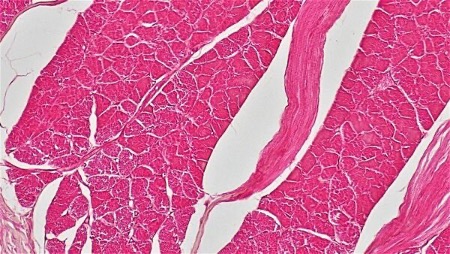Avidity Bio’s RNA Therapy Flashes Early Signs of Treating a Muscular Dystrophy’s Root Cause
June 14, 2024
Source: drugdu
 329
329
Avidity Biosciences’ RNA therapy for facioscapulohumeral muscular dystrophy has preliminary clinical data showing it knocked down expression of a gene that causes this rare disease. More details will be presented at a medical conference this week.
By Frank Vinluan An experimental RNA therapy from Avidity Biosciences has early clinical trial results showing it reduced by half the expression of a gene at the root of a rare, inherited form of muscular dystrophy with no FDA-approved therapies. Furthermore, patients in the study are showing signs of regaining muscle function.
An experimental RNA therapy from Avidity Biosciences has early clinical trial results showing it reduced by half the expression of a gene at the root of a rare, inherited form of muscular dystrophy with no FDA-approved therapies. Furthermore, patients in the study are showing signs of regaining muscle function.
Based on these initial results announced Wednesday, Avidity said it plans to accelerate the start of additional cohorts in the Phase 1/2 study that could support an application seeking regulatory approval in this disease, facioscapulohumeral muscular dystrophy (FSHD). More details about the data are coming soon. Avidity plans to present the preliminary results during the Annual FSHD Society International Research Congress meeting, which will be held in Denver on Thursday and Friday.
In FSHD, overexpression of the DUX4 gene in skeletal muscle activates genes that are toxic to muscle cells. Patients experience progressively worsening muscle weakness throughout the body. Eventually, FSHD patients must use a wheelchair to get around. Avidity estimates that between 16,000 and 38,000 people in the U.S. have this rare disease.
San Diego-based Avidity aims to treat FSHD by silencing the culprit gene. Its therapy, formerly known as AOC 1020 and now renamed delpacibart braxlosiran (del-brax), is part of a new class of RNA therapies called antibody oligonucleotide conjugates. These therapies consist of an antibody that targets the delivery of the therapy to muscle cells. This antibody is linked to an oligonucleotide that modifies RNA function in some way. In the case of del-brax, the RNA component is small interfering RNA (siRNA) intended to reduce the expression of DUX4 messenger RNA, which in turn reduces expression of DUX4 protein.
Del-brax is being evaluated in a double-blind, placebo-controlled Phase 1/2 clinical trial in which 39 participants were randomly assigned to receive one of two doses. The preliminary results announced Wednesday are for 12 patients who received the low dose. On average, these patients experienced a greater than 50% reduction in DUX4 regulated genes. Tests also showed average reductions of 25% for a novel circulating biomarker and creatine kinase, a key measure for muscle damage.
The del-brax clinical trial is not statistically powered to assess muscle function benefit, but it is exploring measures of mobility and muscle strength. It is also gathering patient-reported outcomes and quality of life measures. Avidity said early results show trending improvement in upper and lower limb muscle strength as well as functional improvement as assessed by patients’ ability to use their arms. The comparators are a placebo and a natural history study.
So far, the therapy appears to be safe and well tolerated. In an investor presentation, Avidity said the most common adverse events were fatigue, rash, anemia, and chills. All adverse events reported in the study were classified as mild or moderate. There were no serious adverse events and no patients discontinued the trial.
In a note sent to investors, Leerink Partners analyst Joseph Schwartz noted that Avidity executives previously said that based on human genetics studies and mouse data, they would be pleased with a 20% change in gene expression. The results more than met that mark.
“Overall, we see this data as impressive, especially considering that the data is from the first and lowest dose cohort,” Schwartz said. “Furthermore, the data support that targeting DUX4 directly can have a positive impact on function as early as 4 months and are clearly the fruit of [Avidity’s] rigorous approach in FSHD.”
Avidity faces competition in FSHD. Similar to Avidity, Dyne Therapeutics uses targeting antibody to deliver oligonucleotides to address disease-causing genes. But Dyne’s FSHD program is still preclinical. Its most advanced programs are in myotonic dystrophy type 1 and Duchenne muscular dystrophy. Sanofi is spreading its bets in the rare muscle disease. A 2022 alliance with RNA startup miRecule is developing an FSHD therapy that employs an antibody from Sanofi, research that is still preclinical. Last month, Sanofi paid Fulcrum Therapeutics $80 million up front for outside of the U.S. rights to losmapimod, a small molecule designed to modulate DUX4 expression. This Fulcrum drug is in Phase 3 testing.
Public domain image by Flickr user Berkshire Community College Bioscience Image Library
Read more on
- China Sino Biopharmaceutical Signs Exclusive Licensing Agreement with Sanofi for Rofalcitinib March 4, 2026
- Gan & Lee Pharmaceuticals’ new PROTAC drug GLR2037 tablets have been approved for clinical trials to enter the field of prostate cancer treatment March 3, 2026
- AideaPharmaceuticals plans to raise no more than 1.277 billion yuan through a private placement to focus on the global clinical development of innovative HIV drugs March 3, 2026
- Giant Exits! Its Star Business Acquired March 3, 2026
- Focusing on cardiovascular and cerebrovascular diseases! OpenMediLead Medical Intelligence Dual Engines Launch Internal Testing, Connecting Drug Development and Clinical Diagnosis in a Closed Loop March 3, 2026
your submission has already been received.
OK
Subscribe
Please enter a valid Email address!
Submit
The most relevant industry news & insight will be sent to you every two weeks.



